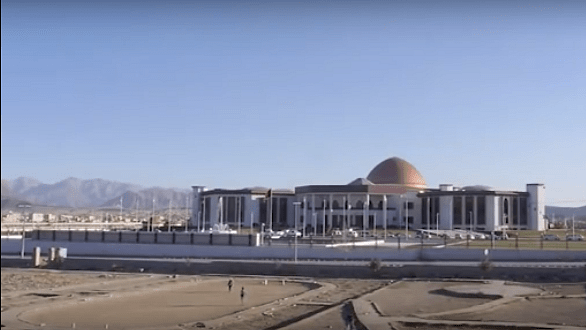The new proposal by the Biden Administration to include India in a United Nations-led meeting of Foreign Ministers of US, Russia, China, Pakistan and Iran and discuss a “unified approach” to Afghanistan is being celebrated by drum-beaters of the Modi government as US signalling a key role for New Delhi in the peace roadmap.
The jubilation glosses over the fact that American and Indian interests in Afghanistan are today diametrically opposed. Essentially, Washington now wants India – which is anyway badly marginalised in Afghanistan - to sacrifice whatever little clout it still has so that the US can pack up and leave by May 1.
The bait to sit at the so-called high table has been dangled in a set of four proposals communicated by Secretary of State Jake Blinken to Ashraf Ghani, the embattled President India is backing to the hilt and would like to last his full second term until 2025! The UN-convened meeting - which Modi’s cronies are going to town on – is Blinken’s proposal number one. But the gist of his other terms is that Ghani should step down for “a new and inclusive government” – which goes against India’s interests as it will pave the way for the takeover of Afghanistan by the Taliban who India sees as a bunch of Islamic terrorists taking orders from Islamabad.
And Blinken has roped in Turkey – another minus from India’s perspective - to mediate between the Afghan government and the Taliban to reduce violence levels so that a “Peace Government” can be put in place. With everything stacked against New Delhi what’s the rejoicing all about?
Blinken’s letter to Ghani, the man New Delhi is banking on, is not only impatient and impolite but outright insulting. The letter is like an ultimatum to follow US instructions to step aside for a new regime or face the consequences. Blinken disparagingly tells Ghani to “understand the urgency of my tone” in so many words, conveying US frustration with him and probably his lone backer - India. Play ball or get out is Blinken’s blunt message.
Blinken goes to the extent of warning Ghani about “a Spring offensive by the Taliban”, and that the security situation will “worsen” and the Taliban “could make rapid territorial gains” in the aftermath of an “American military withdrawal by May 1 as was committed in the Taliban peace deal signed under Trump”.
Turkey has taken very seriously the task assigned to it by Blinken and scheduled a meeting of the two Afghan sides in Istanbul on March 27. But there are no signs of the UN-led meeting India is supposed to participate in with US, Russia, China, Pakistan and Iran. Nobody knows whether it will be at all held or simply done away with.
But a section of the Indian media is trumpeting it to please Modi and BJP who think that their stocks go up each Washington accords any priority or attaches any importance to India. This complex springs from the humiliation caused by the cancellation of Modi’s US visa. The proposed UN grouping by Washington which includes India is therefore like a “badge of honour”.
Under America’s umbrella, India was initially on an excellent wicket in Afghanistan post the US invasion. It opened two new consulates, spent $ 3 billion on developing infrastructure and paid back Pakistan its own coin from Afghan soil, resulting in persistent Pakistani complaints to Washington about RAW activities.
But India’s fortunes began to slide with the slow but steady comeback staged by the Taliban. They started inflicting casualties on NATO and US forces with Pakistan’s collusion ultimately crushing them. Terrified Afghan government forces began retreating without a fight. As Taliban took control, Russia, China, Iran, Saudi Arabia and central Asian neighbours were falling over one another to woo them. Pakistan looked on with immense satisfaction as its progeny rose from the ashes winning international recognition and legitimacy.
Unable to exorcise the ghost of the Kandahar hijacking, New Delhi refused to have any truck with the Taliban and faithfully backed the Hamid Karzai-Ashraf Ghani governments. As India and the Taliban were not on talking terms – and probably still aren’t – New Delhi was kept out of all global brainstorming for Afghan peace. There was no place for India in the Quadrilateral Coordination Group which had US, Afghanistan, Pakistan and China, the original Moscow process or United Nations April 2020 “6+2+1” discussions.
Trump shut the door on Modi when he refused to send Indian soldiers to Afghanistan to fight America’s battle. India didn’t figure in America’s exit plan as Washington was solely dependent on Pakistan – which insisted on keeping India out - to bring the Taliban to the negotiating table and facilitate the withdrawal of US-NATO troops. There was no role at all for India in the talks preceding the US-Taliban deal in February 2020. As a matter of fact, the US did not even consult the India-backed Afghan government, and in fact forced it to release thousands of prisoners to please the Taliban!
Zalmay Khalilzad, the US Special Envoy for Afghanistan appointed by Trump and retained by Biden, has repeatedly told Ajit Doval, S. Jaishankar, Harshvardhan Shringla and Modi to open channels of communication with the Taliban if India wants to remain a player in Afghanistan and preserve its $ 3 billion stakes after the US withdrawal.
The Taliban have expressed their willingness to engage with India and even declared that they have a mind of their own – claiming that they are not Pakistan’s proxy! Not too long ago, they announced that they are prepared to treat Kashmir as India’s internal issue. What’s not so well known is that the Taliban have quietly released seven Indian workers belonging to an engineering firm they had kidnapped in Baglan province in May 2018. They were released in batches. The last prisoner, Mantu Singh, was freed on September 13, 2020 coinciding with the commencement of Intra-Afghan Negotiations (IAN) in Doha.
If India sticks to its policy of shunning the Taliban, what role can it play in the UN-convened meeting of foreign ministers proposed by Blinken to arrive at a “unified approach” to peace in Afghanistan? All the other participants – US, Russia, China, Pakistan and Iran – are on excellent terms with the Taliban. So what would Jaishankar do in their midst? Or is Blinken confident that he can coax New Delhi into breaking the ice with the Taliban ahead of the foreign ministers’ meet under the auspices of the UN?
The writing in big bold letters on the wall is that sooner than later the Taliban will rule over Afghanistan from the Parliament building constructed by India at a cost of $90 million and inaugurated by Modi in 2015.
Vivek Katju, who was India’s Ambassador in Afghanistan, says that Blinken’s letter to Ghani “virtually asks him and his administration to do the honourable deed of falling on their swords for Afghanistan’s future”. But his advice to India is to “use the opening provided by this US initiative to urgently invite a Taliban delegation and convey its positions on Afghanistan and the region directly to it”. Although their morale is sky-high after inflicting a military defeat on US-NATO armies, they may still be susceptible to the discreet charms of India.
































